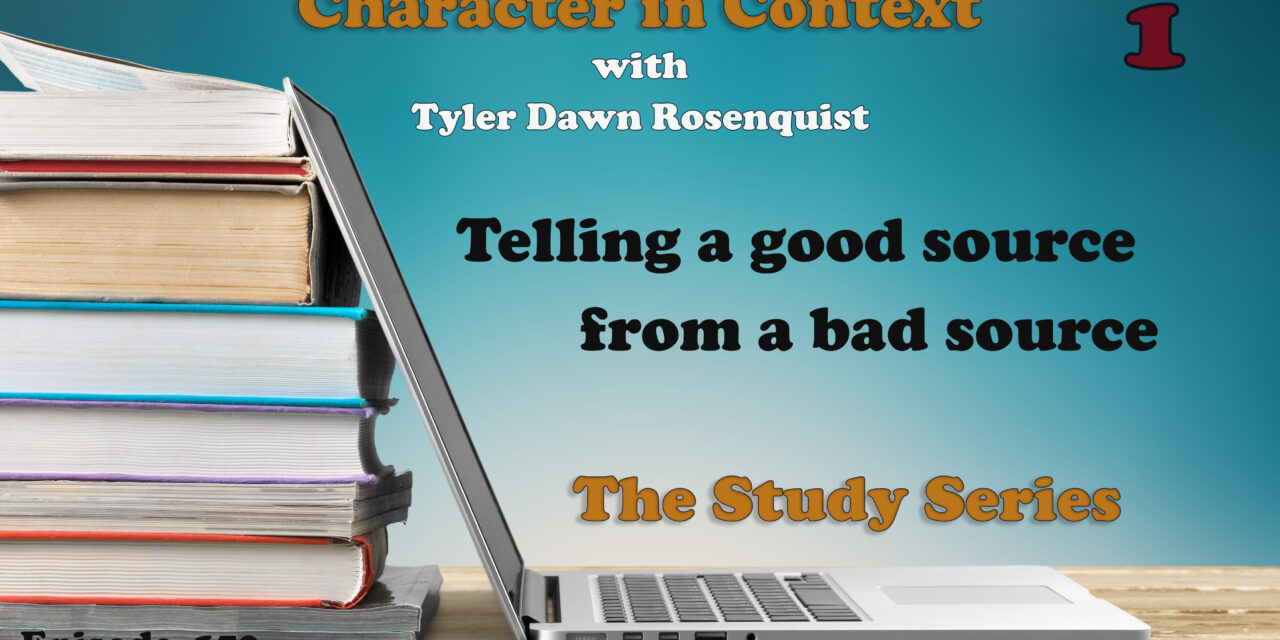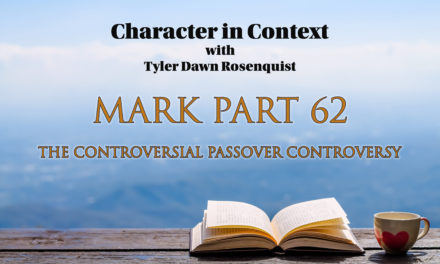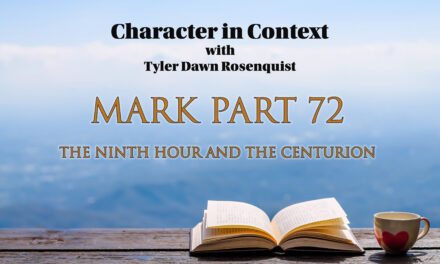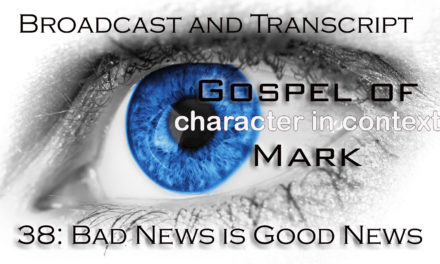One of the most important first steps in really getting serious about Bible context studies is to get yourself a good quality library without investing in stinkers, and without spending more money than you have to. This week, we’re going to look at the most common red flags that will keep you from buying books that should have never been printed, and avoiding common YouTube and Google mistakes.
The Book list (updated as I add classes)
My Facebook E-Book Sale Page: https://www.facebook.com/TDRScholarlyBookSales
If you can’t see the podcast player, click here.
Hi, I am Tyler Dawn Rosenquist and welcome to Character in Context, where I usually teach the historical and ancient sociological context of Scripture with an eye to developing the character of the Messiah. But not right now, right now I am doing a series about how to not waste your time with bad study practices, bad resources, and just the general confusion that I faced when I started studying the Bible and was trying to figure out what to do and whose books I should read. Bottom line, I read a lot of nonsense and spent a ton of money on it. I am going to give you some basics on how to avoid a lot of the pitfalls, save money, maximize your time and effort, and get the most out of what you are doing.
So, the first topic is near and dear to my heart because you guys work hard for your money and shouldn’t have to give it to someone who is making up stuff. And there are a lot of books out there by people who faked their research, presented propaganda as though it was real archaeology and history, passed on unsubstantiated urban legends as truth, or just really hadn’t read enough of the Bible to justify writing anything about it. And if you’ve read enough books about Revelation, those tend to be the worst offenders for those who haven’t bothered to truly do their homework. Tim LaHaye isn’t the only one out there writing pure fiction.
Let’s look at some of the easier red flags that you can be on the lookout for in building your own scholarly or theological library:
(1) if the name of the author is obviously fake or anonymous. This is more of a problem in fringe movements where someone might take for themselves an ancient title or ancient Near Eastern sounding name, or something that sounds “Hebraic” to them. I do hold names like “Watchman Nee” and “Witness Lee” to different standards because that is what they were called, and we know their real names, and they lived during times of terrible persecution in China. When authors in the western world do it—for example, putting “Rav” in front of their name when they are not actually a Rabbi—it is generally a self-designation to elevate their reputation. If you can’t know anything real about an author, be really hesitant to take their spiritual counsel on anything. No identifying information equals all profit and no accountability.
(2) Titles or descriptions of books that sound sensationalistic—like “88 Reasons Why the Rapture Is in 1988” or the sequel that made the same claims about 1989 (I think the 89th claim was “because I was wrong last year”). Or books that tout themselves as being “the only book you will ever need to read” on a subject. This is a form of manipulation called “priming the pump” where you are told exactly what to believe before the person even presents their evidence (if any) in order to make you more susceptible to persuasion. I can think of one exception, where two scholars got together and wrote “Not Afraid of the Antichrist”—really good book by Craig Keener and Michael Brown, both of whom have doctorates—Keener in NT studies and Brown in ancient Near Eastern (ANE) languages and literature. Which brings me to
(3) just because someone has a doctorate, doesn’t mean that whatever they write is something they are actually qualified to write or teach about. Let’s say I was insane and didn’t leave school after getting my bachelor’s degree in chemistry—let’s say I got my PhD. If I then got interested in Biblical Studies and wrote books under the name Dr. Tyler Rosenquist, PhD but wasn’t forthcoming about the fact that my PhD is in a totally unrelated area of expertise, then it would be pretty deceptive. You would naturally think that I had a PhD in some sort of Biblical Studies. In essence, I would be priming the pump to make you think I am more educated than I am in that particular field. As a real life example, I will point out Dr Ernest Martin and his books and claims about archaeology. He’s the person responsible for some outlandish claims of the Temple being down in the City of David and the Temple Mount actually being the site of the Fortress Antonia—but a study of Josephus’ Wars of the Jews puts a quick end to that. Well, not quick, because you actually have to read quite a bit of it, but well worth the effort. He made his claims while touting himself as “Dr.” but his doctorate was in education and was granted by an unaccredited WCOC University. Although he was responsible for sending students over to assist in the archaeological digs of the great Benjamin Mazar while Dean of the school, he was never truly involved in anything significant himself. But he made a lot of money with his claims and is popular among conspiracy groups. So, don’t feel bad about checking someone out. Google, in this case, can be your friend. We’ll talk about how to do that some other time.
(4) Let’s talk about footnotes. Vague footnotes might as well not even be there and is usually a sign of a person not studying. As an example, someone was telling me that Tertullian had said that Christmas came from Saturnalia. Of course, I knew this was nonsense because Tertullian mentions absolutely nothing about Christmas or about the celebration of birthdays. He lived in Tunisia, died around 220 CE and the first publication of proposed birth dates of the Messiah never happened until about 200 CE, all the way over in Egypt. And those were in the spring and late summer. So, I asked for a source—because no way was I going to read everything Tertullian wrote to check on claims. The Early Church Fathers is not one of my areas of study—we all have to draw the line somewhere. Anyway, she sent me an article on the internet, one that made claims and then actually had footnotes. The footnotes all read “Tertullian.” Tertullian, just FYI, wrote over forty works. So, if someone actually had read his stuff and they had proof, they would share it, just sayin’. Another example is Alexander Hislop—and he had some footnotes, some. But the problem is that he would cite an entire series of books, wouldn’t even narrow it down to a volume, much less give page numbers and so you literally have to read everything to check up on his claims. When you do, you find that he misrepresented and cherry-picked his “factoids” out of context and a lot of stuff he just flat out made up.
(5) Expired research. There are some fabulous older books out there but the truth is that research often has an expiration date. New archaeological finds sometimes completely change the way we view things in the Bible. Unearth a new ancient Near Eastern legend or law code or other cache of secular or religious documents and they change the landscape of what we believed we knew before. The past 200 years have so changed the landscape of what Bible scholars thought they knew that much of their commentary must be tossed out. They did the best they could with what they had, I am not dissing them. In fact, if they could return from the dead they would probably be giddy with all the resources they now have available. I know that when there is a new discovery that changes something I have been teaching, it is more exciting than I can say. No one particularly enjoys being proven wrong but if your goal is to learn, then you just get used to it. The only way to be right all the time is to refuse to study. You’re still wrong, but at least your ego doesn’t know it. In this case, the research wasn’t necessarily bad (although sometimes it was) but we just know more now about the world of the Bible.
(6) People teaching linguistics (language related studies) without any formal education in any ancient languages. This is actually a big part of the reason why we have so many terrible teachings out there about the Tetragrammaton, the four-letter name of God in Scripture. And just let me be clear—everyone has heard their chosen pronunciation in dreams. I have personally heard two of them, depending on which one I was convinced of at the time. Dreams alone can never lead to doctrine, guys, okay? You know what? It’s okay to ask and it’s okay to dig deep to find out a teacher’s qualifications. I am straight up open about mine—I am not formally educated in Biblical studies, my Hebrew and Greek are deplorable, I am not an archaeologist, scholar, historian, or theologian. What I do is read what the experts write—and not just one expert and assume their POV is the only one—and bring it down to a more accessible level for people without the time or money to do it themselves. I am nothing but a layman who reads too much and spends way too much money on books. But I will always give you my reading list. Or, as I like to joke when people call me one of those things, “I am not a scholar, I just play one on the radio.” I am not hurt when my credentials are questioned because I actually don’t have any! But if you want to know who the people are who teach me, and they are credentialed, I will definitely send you their way!
(7) No peer review. Obviously, my blog posts and books fall into this category, not gonna lie. I am not accountable to scholars because they don’t know who the heck I am and they have no reason to read my books. However, I also try very hard not to make claims that I cannot substantiate with actual evidence (sometimes one will slip by, it happens). And when something is just my personal opinion, I will usually just admit it before even giving you that opinion. But with scholars, theologians, historians, linguists, archaeologists, etc., they have to answer to their peers. If one scholar makes an outlandish claim, it won’t go unnoticed. It will be challenged by people who are experts in the field, and this is called peer review—their peers, equals, co-laborers in a field of study read their work and find the flaws. That’s why it is important to read more than one book on a subject, to make sure you didn’t end up reading the one dude with loonie ideas about a side issue. I’ve sadly done that before and taught it as though it was some sort of scholarly consensus as the “one true way” to think about a subject. Books are far more likely to be peer-reviewed if they have reviews from other respected scholars, have detailed and specific footnotes, and have a substantial resource list in the back.
(8) The book is dedicated to proving that things are pagan, hidden by some grand conspiracy, or attacking everyone except those within a small, niche group. These books are never written by scholars because anyone who studies enough comes to find out that these sorts of books are written by people with agendas who haven’t given enough thought or study to the areas they are speaking about. Hislop, sometimes mislabeled as a historian, was soundly denounced for his Two Babylons by his fellow Protestants almost two hundred years ago as being utter nonsense, and between then and now, the deciphering of the Rosetta Stone has debunked some of the sources he used, and revealed that his assumptions were largely based on disinformation, blatant racism, and mishandling of legends, chronology, and an almost complete lack of knowledge of Babylonian anything, much less two Babylons. And most, if not all, books today written to denounce things as pagan are based upon his propaganda pamphlets, which were published in book form.
(9) Speculative books—and these ones are hard to really identify. A great example would be anything dealing with paleo-Hebrew “word pictures” also called “agri-bioinguistics” and because of the speculative nature, this is a very popular thing because people enjoy puzzles but it is a subject without even one iota of documentation or any other kind of proof. Paleo-Hebrew can’t be proven to be anything but a font with meanings assigned by people over the last hundred years. Mazzarot books are also a big offender, the word mazzarot occurring only once in Scripture and interpreted to mean constellations because the context would appear to support it but really it is still a guess. It isn’t actually until the 10th century that we see the word mentioned outside Scripture defined as meaning constellation but when the scholars of the 3rd century BCE translated the Hebrew Scriptures into Greek, they evidently had no real idea what Mazzaroth meant because all they did was transliterate the word—using Greek letters and sounds as best they could to duplicate it, even though Greek has perfectly good words for things like constellations, astronomy and astrology. Books about Melchizedek, Nimrod, and anything that is barely mentioned or confusing in the Bible tend to inspire very long-winded books full of opinions with really nothing behind them to back them up.
(10) Book quality. There are a lot of niche books out there that fall into this category. Really, if a book written during modern times has access to good quality pictures of, say, images of Tammuz and Ishtar but instead use really darkened and obscure ones so that they can misrepresent those images—it’s best to run and not walk. I actually did a blog about the claim that Tammuz was carrying a cross—sure, it looked like it from certain books but if you actually look at the relief in question, (1) we don’t know that it actually is Tammuz at all, and (2) those are very clearly branches with large leaves and not crosses. You are investing money in materials, make sure it is well spent. When there is a picture in a book, it should be properly labeled so that someone can find where it is from and study it.
(11) Memes are never an acceptable source of credible information. Memes are the descendants of the propaganda posters and short speeches developed during WWI as a way to “hit and run” a crowd with incredible claims in order to generate outrage without having to actually back up those claims with legitimate information. Hence, there are memes out there about Artemis, Ishtar, Tammuz, Obelisks and a hundred other things making claims that can’t be backed up because there isn’t enough space. They work because people’s suspension of disbelief has been compromised by shock and anger. Ask for sources. I guarantee you that they don’t have any and will prove it by telling you to do your own research. If they had a source, they would give it. Same with teachers and book authors. People who do the work absolutely love proving it. “Look at me! I know stuff and read big books!”
(12) Pastor Google and Rabbi YouTube have their uses, but know that YouTube doesn’t run credibility checks on the people claiming to have the knowledge required to teach you linguistics, historical context, theology, or whatever they are pushing. And don’t even get me going on internet prophets or we will be here all day. Google is useful for some things, but I guarantee you that if you type in “Is such and such true” you will get a million people telling you that it is true. If you type in “Is such and such a lie” you will get just as many people making their case that it is a lie. Google is the very best place to go if you want to prove yourself right and possibly the worst place for finding out what is actually true. YouTube is just as bad. I mean, people can teach anonymously, and I don’t listen to anyone whom I am not able to check up on. No accountability = not being worth my time. Same with social media and people who want to teach but under assumed names. Too many con artists out there and when they get found out on one account they just switch to another.
Good scholars/theologians/historians/whatever come from all denomination backgrounds. I read Jewish, Protestant, and Catholic scholars because they have devoted their lives to a field of study. I might not listen to a person in doctrinal issues but if they are a top notch scholar in the area of, say, honor and shame or justice and righteousness or numismatics (study of coins), then it makes no difference where they are on their weekends. I respect the integrity of their research. It is arrogance to turn aside an expert because you don’t care for their take on the Trinity or infant baptism. As for finding out about the good resources, we’ll talk about that more next week. Learning who the experts are isn’t something that happens overnight, although having a friend who studies is very helpful. Once you know who the experts are, it is much easier to ask people for their own sources. If someone, say, is talking about paganism but doesn’t know the names of Karel van der Toorn, Gwedolyn Leick, Stephanie Dalley, or any number of others but does know Alexander Hislop, Lew White, Ralph Woodrow, Richard Rives or the programs Sunburned or Truth vs Tradition—then you know they haven’t been introduced to the idea of what is and is not a credible source. And, you know what? That was me once. I am not mocking anyone. But the truth of the matter is that the scholarship within the Hebrew Roots Movement, the Messianic movement, the out of church movement, and just whatever fringe group you want to name, is very poor indeed. Big fish in small ponds have been able to get away with dishing out urban legends and propaganda because they haven’t taught the people they are teaching how or even what to study except for their own materials. But it is very important to me that you know your options, and who has and hasn’t done the hard work required to be taken seriously. It’s so easy to be taken in with bad sources and to not understand that you can ask questions and even what questions should be asked. If you can’t ask questions, I am telling you right now that your teacher cannot be trusted with your and your family’s education. A teacher might say “I don’t know” and that is perfectly acceptable, unless they were claiming that what they were teaching was absolute fact. Then there is a problem. Don’t settle for platitudes, guilt trips, or runarounds. A person might not have an answer right in front of them but they should be able to give it to you, if they actually have one.
You don’t have to take anyone’s word for anything. And if you are expected to, that’s a huge problem. You deserve to at least have the opportunity to learn at least as much as the person who is teaching you and no one has the right to withhold that from you. This isn’t a competition to see who can know the most, this is a labor of learning together and building the Kingdom as a team—with the next generation knowing and accomplishing even more than we could because we were generous with what we had.
Next week we’ll talk about how to identify good sources that will lead to credible teachings and fruitful study.





















